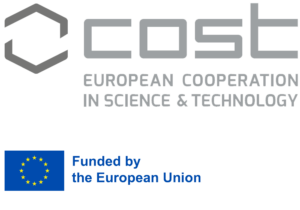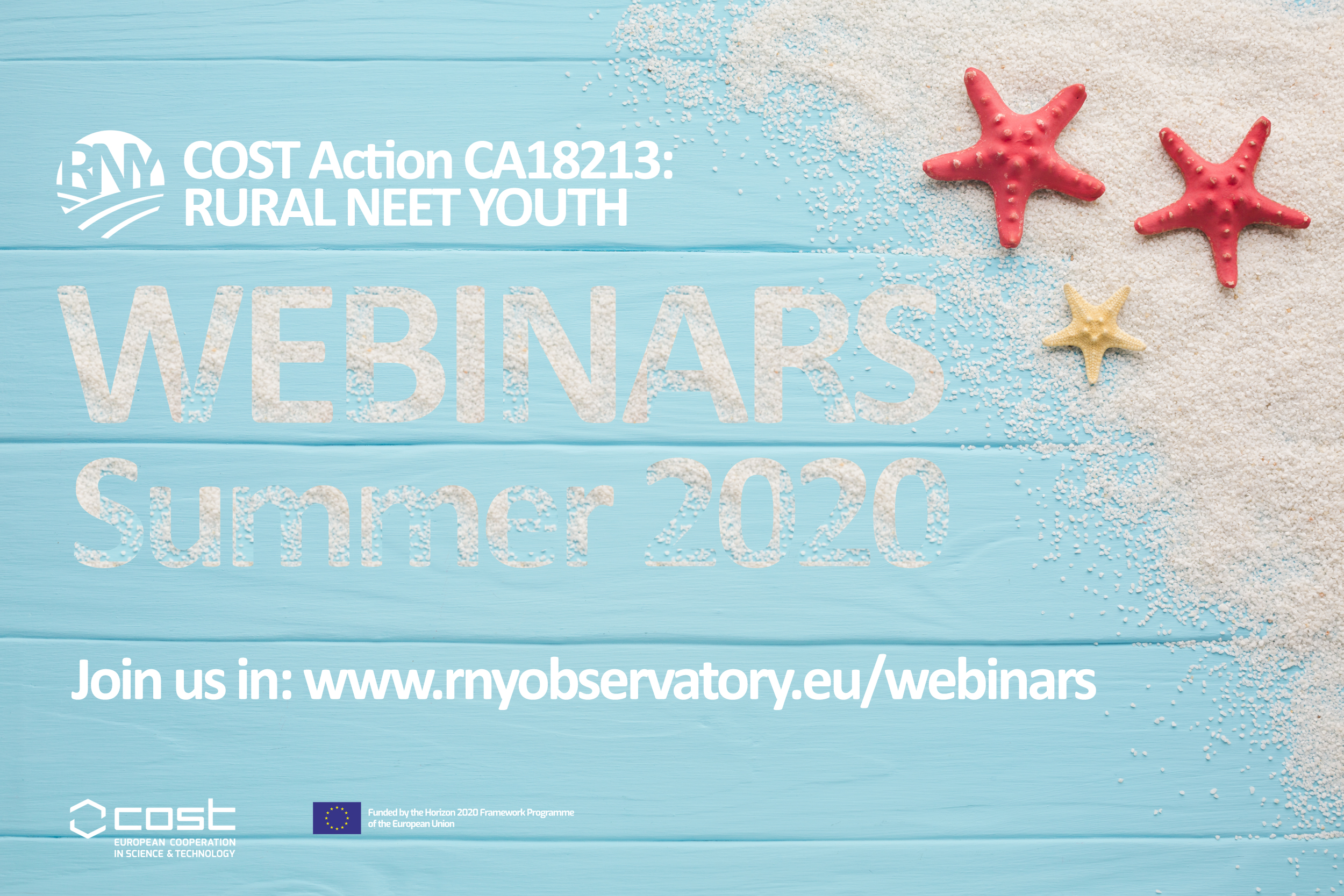
With the recent COVID-19 outburst, COST Actions have become seriously limited in promoting the involvement of stakeholders, whether they are other researchers and scholars, policy-makers, representatives of public services or NGO’s.
In the case of CA 18213, this is a very demanding situation.
That is why we offer this webinars sessions for all the members, stakeholders and persons interested in our topic.
WEBINAR SESSIONS:
3.June.2020 – 15:00h CET | National stakeholders involvement webinars
Francisco Simões (CIS; ISCTE-IUL)
Trends of youth unemployment
The aim of this proposal is two-folded. First, the presentation will explore unemployment trends worldwide, in Europe as well in Portugal, using data from ILO, EUROSTAT and Portuguese Statistic Institute. Second, the webinar will convey a discussion of policies and best-practices deemed to be more effective in addressing youth unemployment. The webinar will involve about 25 professionals and intermediate leaders of The Azores Islands employment public services. The session will be held in Portuguese and will include a brief presentation, group discussions and a Q&A session. The expected duration for the webinar is 60 minutes.
9.June.2020 – 15:00h CET | National stakeholders involvement webinars
Francisco Simões (CIS; ISCTE-IUL)
NEET youths profile in The Azores: What do we know so far? (In Portuguese)
This webinar aims at synthesizing the current knowledge about NEETs in The Azores Islands. To do so, the session will start by an analysis of the evolution of NEETs in Europe, Portugal and The Azores, for the past 10 years. Afterwards, three studies that were undertaken in Region will be summarized. These studies will focus on NEETs profile, lower qualified NEETs professional expectations and also on their perceptions about dominant sectors in rural areas, namely agriculture. The webinar will involve about 10 professionals and intermediate leaders of The Azores Islands employment public services that work directly with NEETs, in the context of the Youth Guarantee program. The session will be held in Portuguese and will include a brief presentation, group discussions and a Q&A session. The expected duration for the webinar is 60 minutes.
24.June.2020 – 15:00h CET | PREMIUM SESSION
Aleksandar Lukic (University of Zagreb, CRO)
Rurality: Meaning and defining dimensions
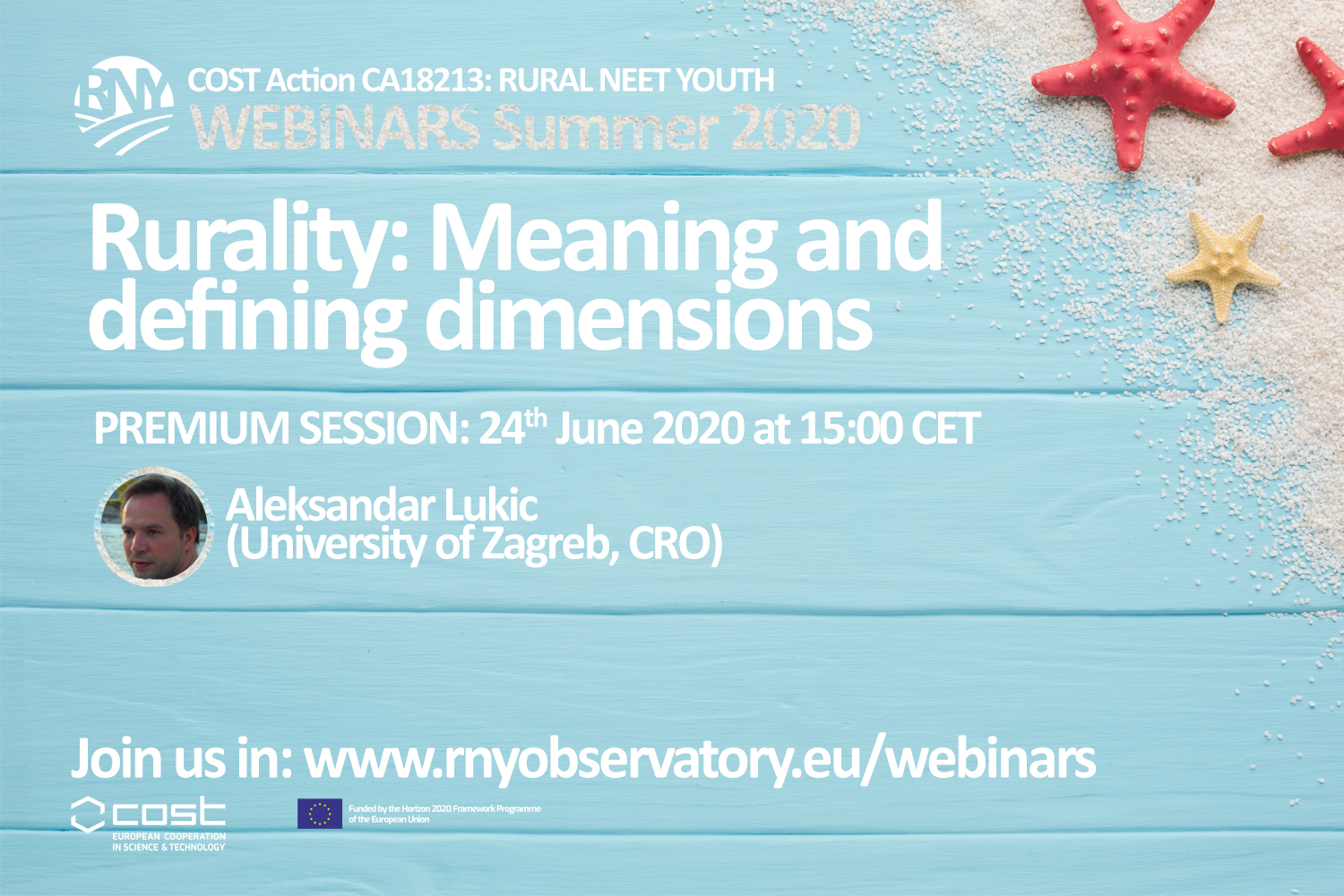
Rurality is a growingly complex definition. Sometimes, it is also seen as negative social category. This webinar will explore different meanings of rurality, based on criteria such as population, landscape, economic activities and other.
![]() Watch the recording on Facebook
Watch the recording on Facebook
29.June.2020 – 15:00h CET | PREMIUM SESSION
Massimiliano Mascherini (Head of Social Affairs Unit, Eurofound)
NEETs: profiles and typologies
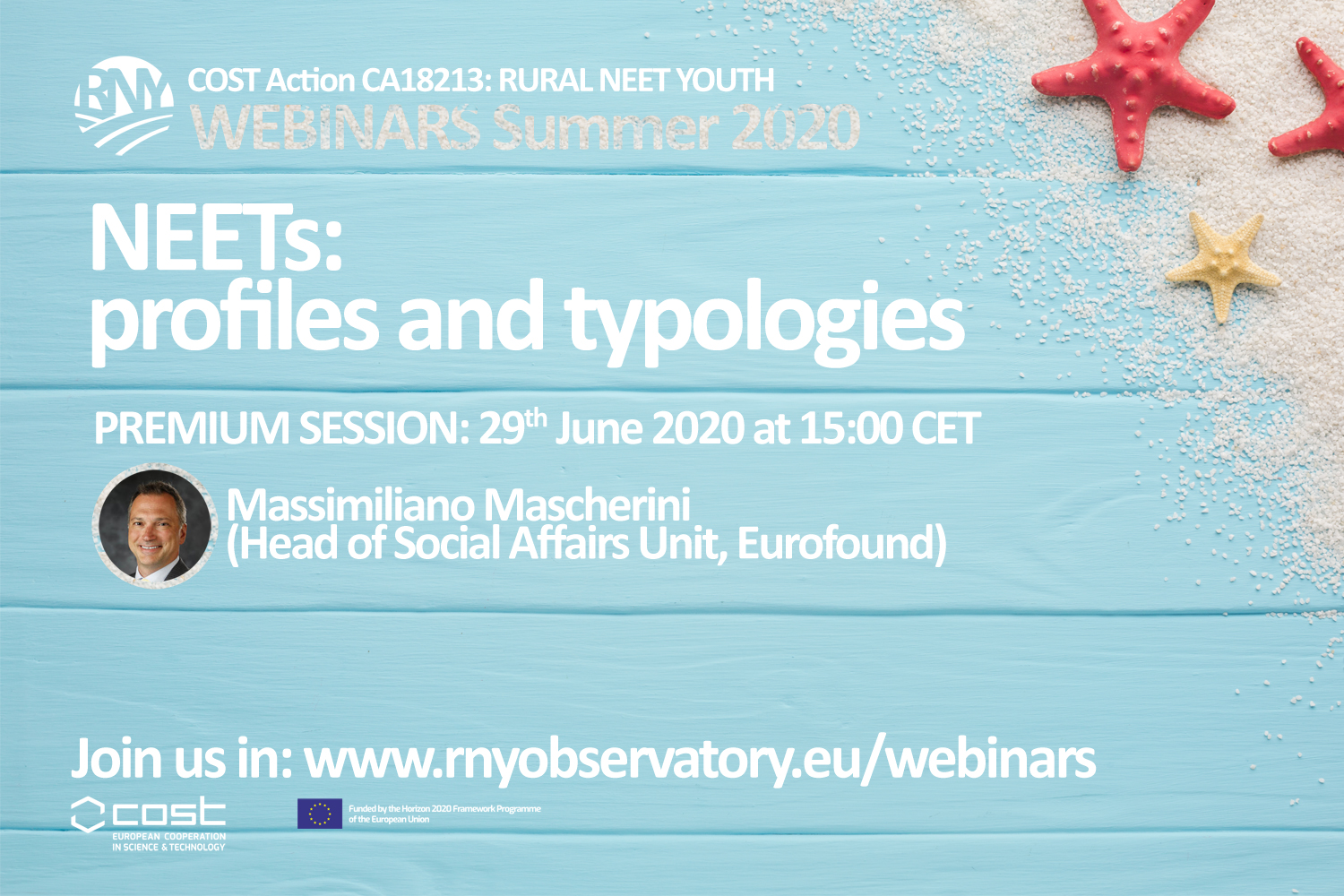
Youths not in Employment, nor in Education and Training (NEET) is a very heterogenous group. Some distinctions have been made between subgroups, based on age subclasses or on unemployment/inactivity status. For the past decade, Eurofound has worked to capture more specific types of NEETs and how they may differ across sex, age groups or degree of urbanization.
![]() Watch the recording on Facebook
Watch the recording on Facebook
02.July.2020 – 15:00h CET | ONLINE MEETING POINT
Maria Manuel Vieira (Permanent Youth Observatory – ICS, University of Lisbon)
Tatiana Ferreira (Permanent Youth Observatory – ICS, University of Lisbon)
Lia Pappámikail (Polytechnic Institute of Santarém (ESE/IPSantarém)
Good practices to reconnect young rural NEETs: public policies versus local responses
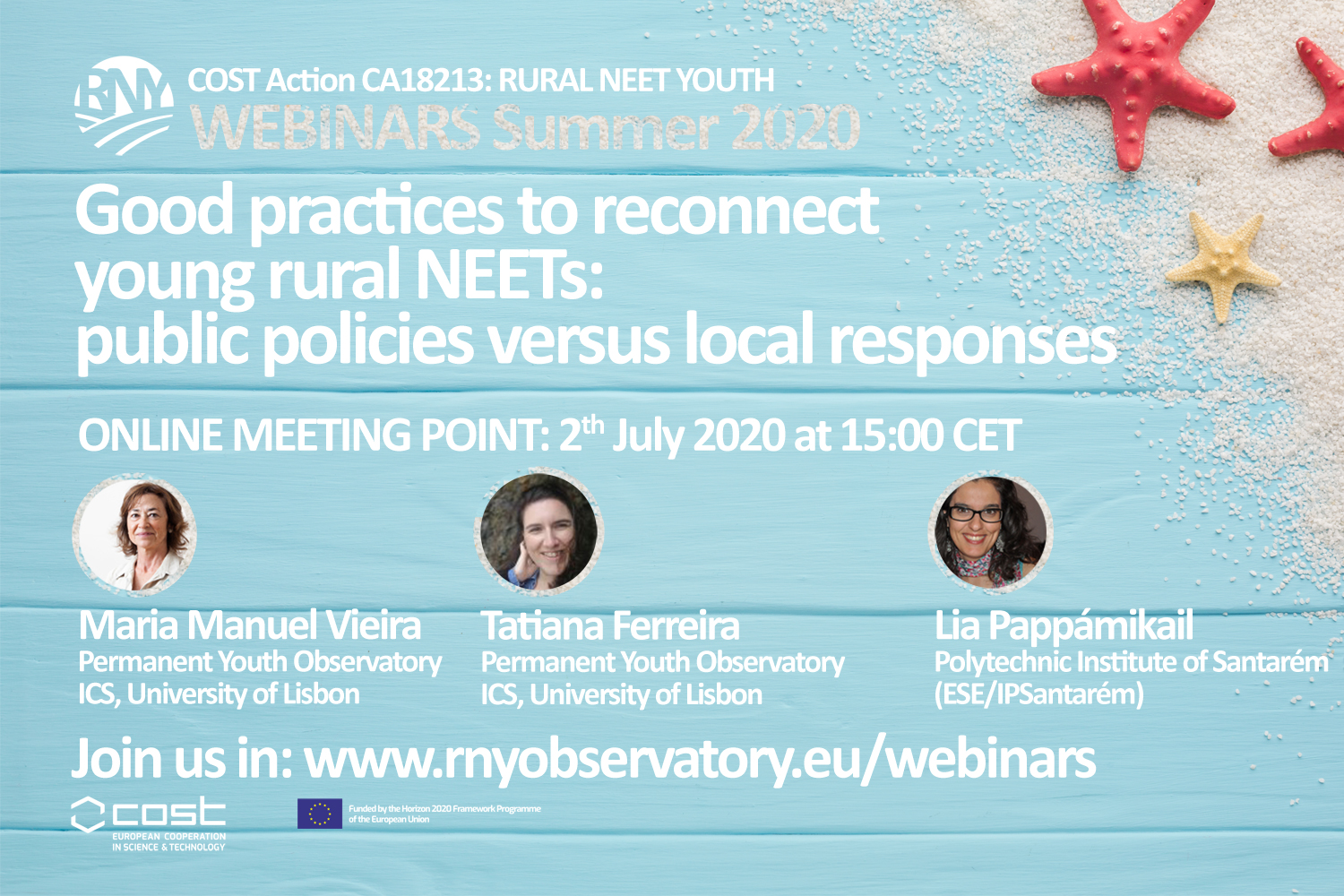
Based on the results of two research projects, one focusing on the implementation of the European
Youth Guarantee program in Portugal and the other a case study at the local level with young rural
NEETs, we intend to discuss and reflect on the potential and limits of these two types of intervention
aimed at reconnect young people in NEET situations with institutions – educational, training and for
employability.
![]() Watch the recording on Facebook
Watch the recording on Facebook
6.July.2020 – 15:00h CET | National stakeholders involvement webinars
Francisco Simões (CIS; ISCTE-IUL)
NEET youths profile in The Azores: What do we know so far? (In English)
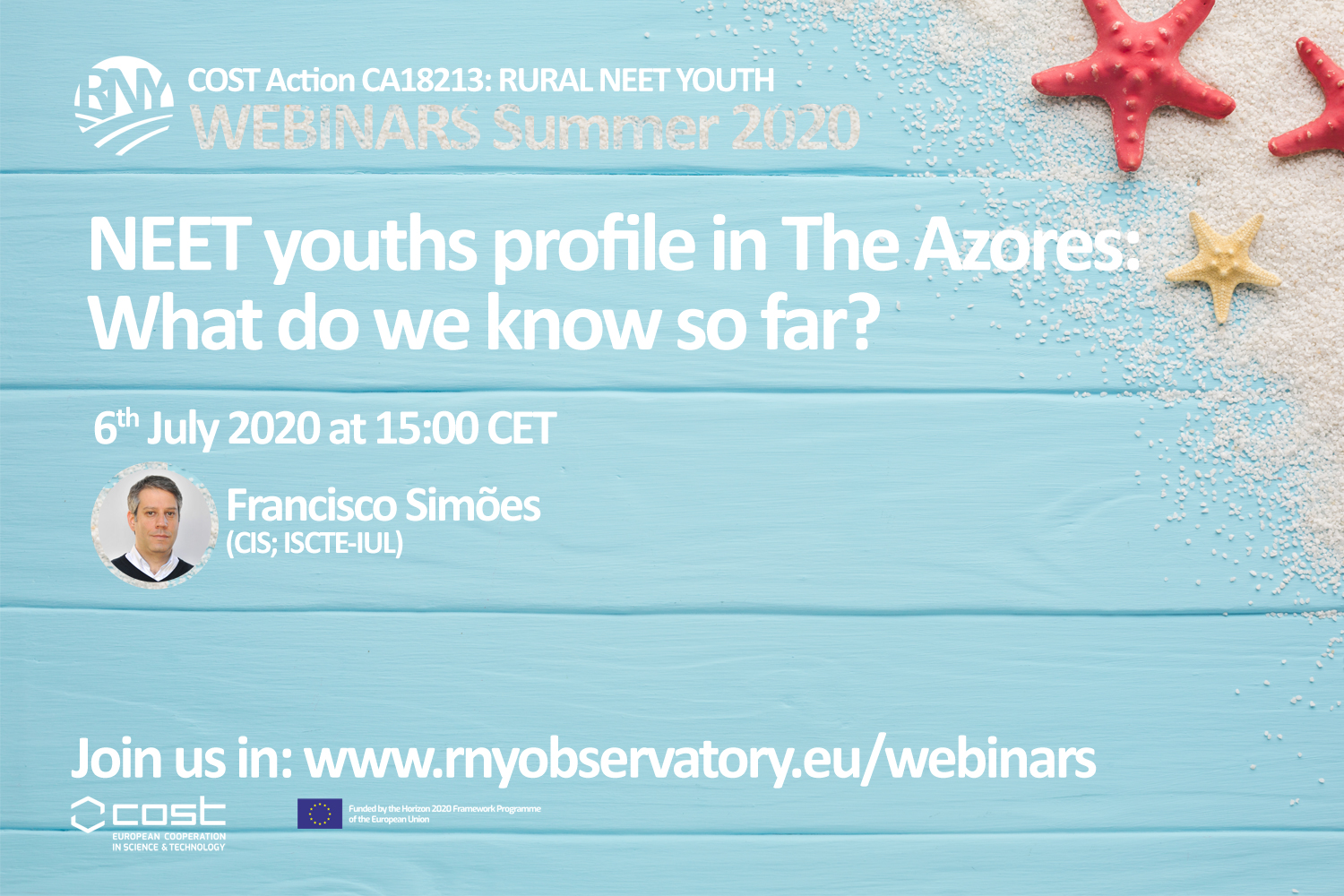
This webinar aims at synthesizing the current knowledge about NEETs in The Azores Islands. To do so, the session will start by an analysis of the evolution of NEETs in Europe, Portugal and The Azores, for the past 10 years. Afterwards, three studies that were undertaken in Region will be summarized. These studies will focus on NEETs profile, lower qualified NEETs professional expectations and also on their perceptions about dominant sectors in rural areas, namely agriculture. The webinar will involve about 10 professionals and intermediate leaders of The Azores Islands employment public services that work directly with NEETs, in the context of the Youth Guarantee program. The session will be held in English and will include a brief presentation, group discussions and a Q&A session. The expected duration for the webinar is 60 minutes.
![]() Watch the recording on Facebook
Watch the recording on Facebook
09.July.2020 – 15:00h CET | PREMIUM SESSION
Jale Tosun (Heidelberg University, GER)
Youth participation in labour markets: Insights from 11 European countries
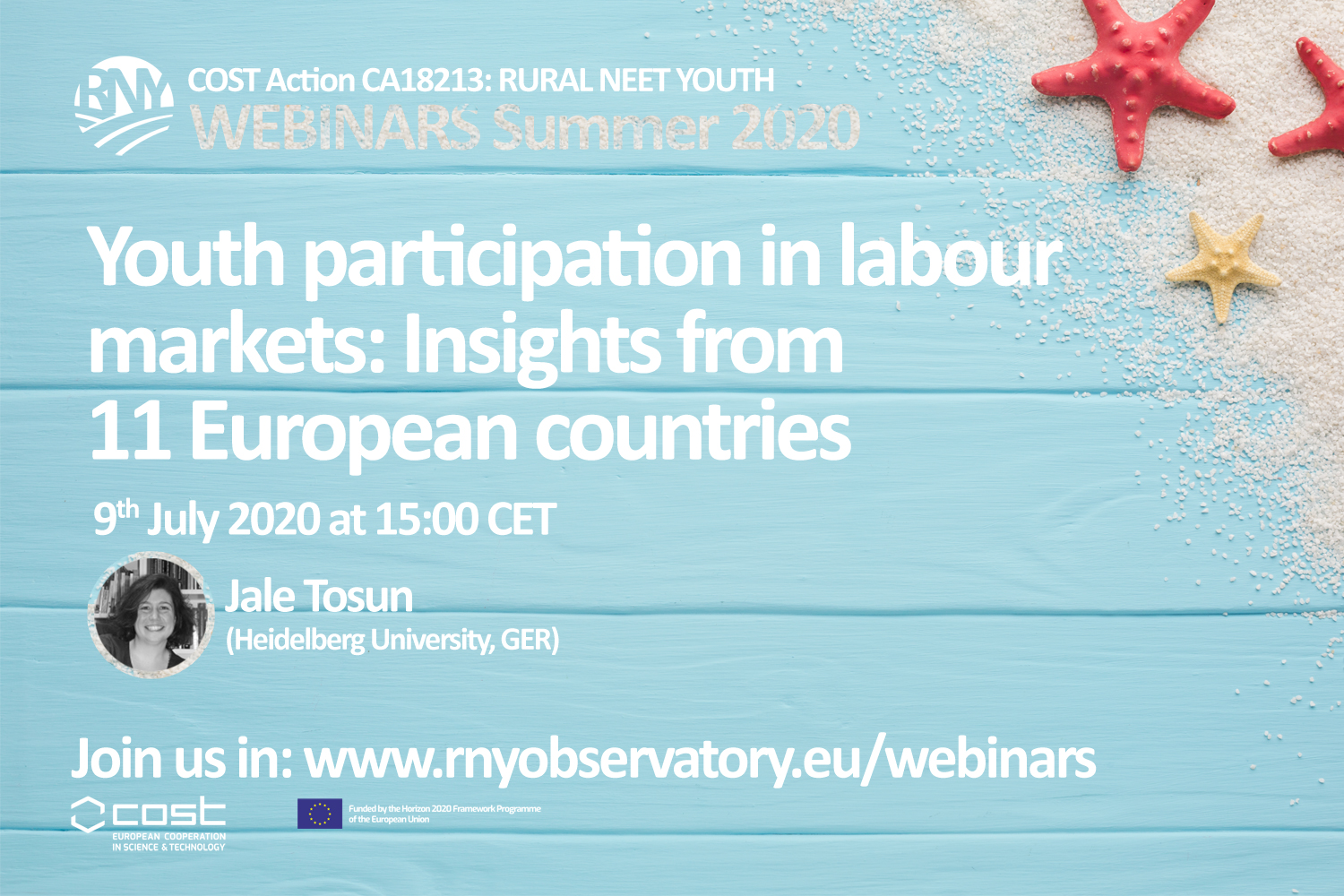
This webinar will draw on the CUPESSE projects findings to analyze youth participation in the labour markets. Some findings stem from this research project. Family matters: there is a striking degree of parent-child similarity in the work-related attitudes, values and decisions and labor market outcomes. Many young Europeans depend on the financial assistance from their parents even if they are employed. Nonetheless, the future expectations of young people are mostly positive and not determined by the level of youth unemployment in their country of residence. The perception of the causes of youth unemployment differs between young people in Greece, Italy and Spain, even though labor economists see parallels. Young people living in rural areas indicated that they lack access to networks that would help them to find employment
![]() Watch the recording on Facebook
Watch the recording on Facebook
13.July.2020 – 15:00h CET | PREMIUM SESSION
Heidi Paabort (Eesti Avatud Noortekeskuste Ühendus) | Kerli Kõiv (Eesti Avatud Noortekeskuste Ühendus)
Estonian Youth Guarantee and Its Values
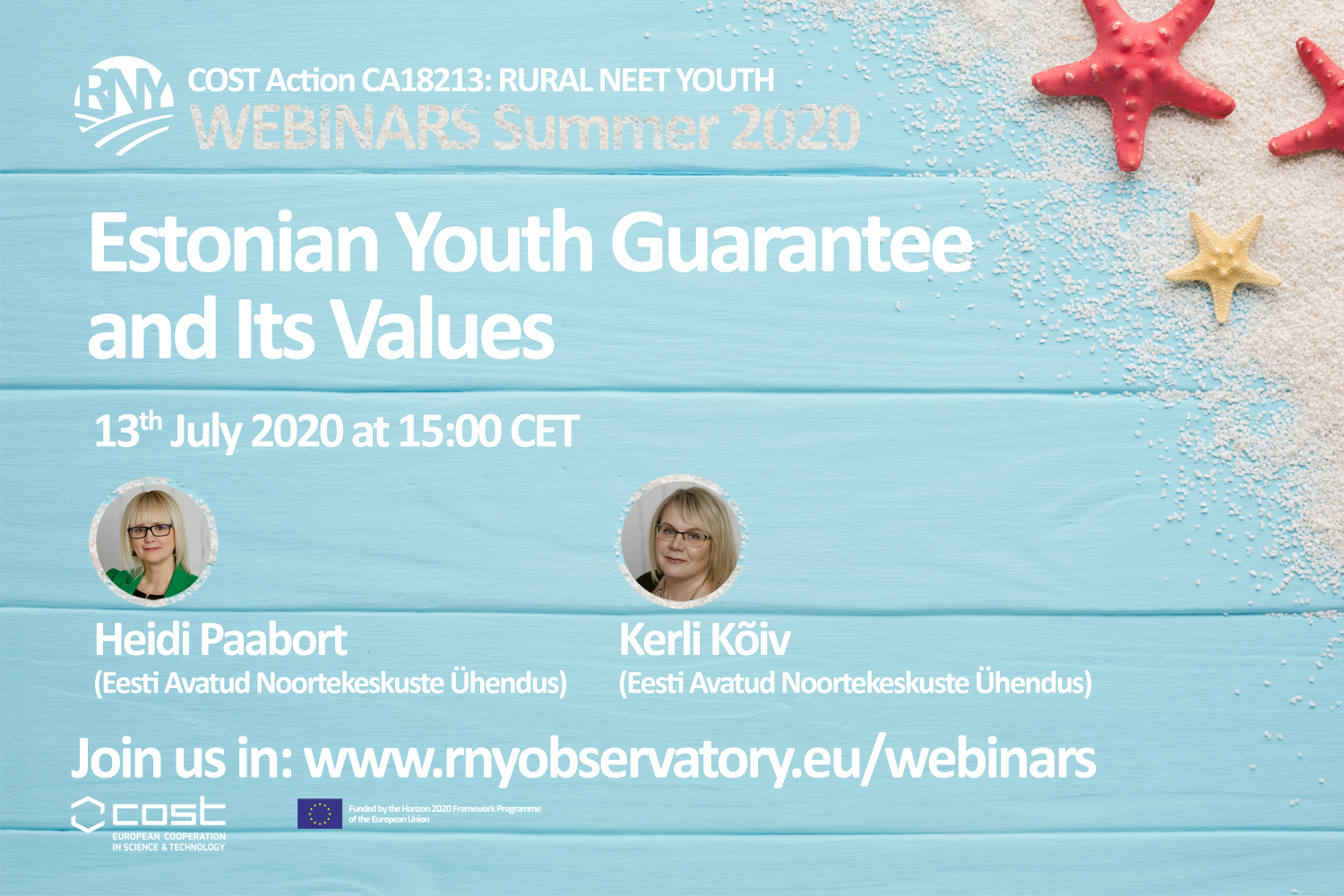
Young people who are not in education, employment, or training (NEET) are one of the most important
global social challenges (OECD 2011). The European Council (2013) suggested that every Member State
should support young people to avoid the subsequent high costs of excluding young people from the
labour market, education, and training. In 2013, the European Council approved the creation of the Youth
Guarantee to ensure that young people under 25 years of age will receive a good offer of employment,
continued education, apprenticeship, or training within four months of becoming unemployed or leaving
education. Estonia approved the Youth Guarantee programme in 2014. The Youth Guarantee report of
2016 of the European Commission emphasises the need to further focus on better sectoral
coordination, early intervention, and unregistered NEETs.
![]() Watch the recording on Facebook
Watch the recording on Facebook
16.July.2020 – 15:00h CET | PREMIUM SESSION
Antonella Rocca (University of Naples, IT)
Being NEET in Europe Before and After the Economic Crisis: An Analysis of the Micro and Macro Determinants
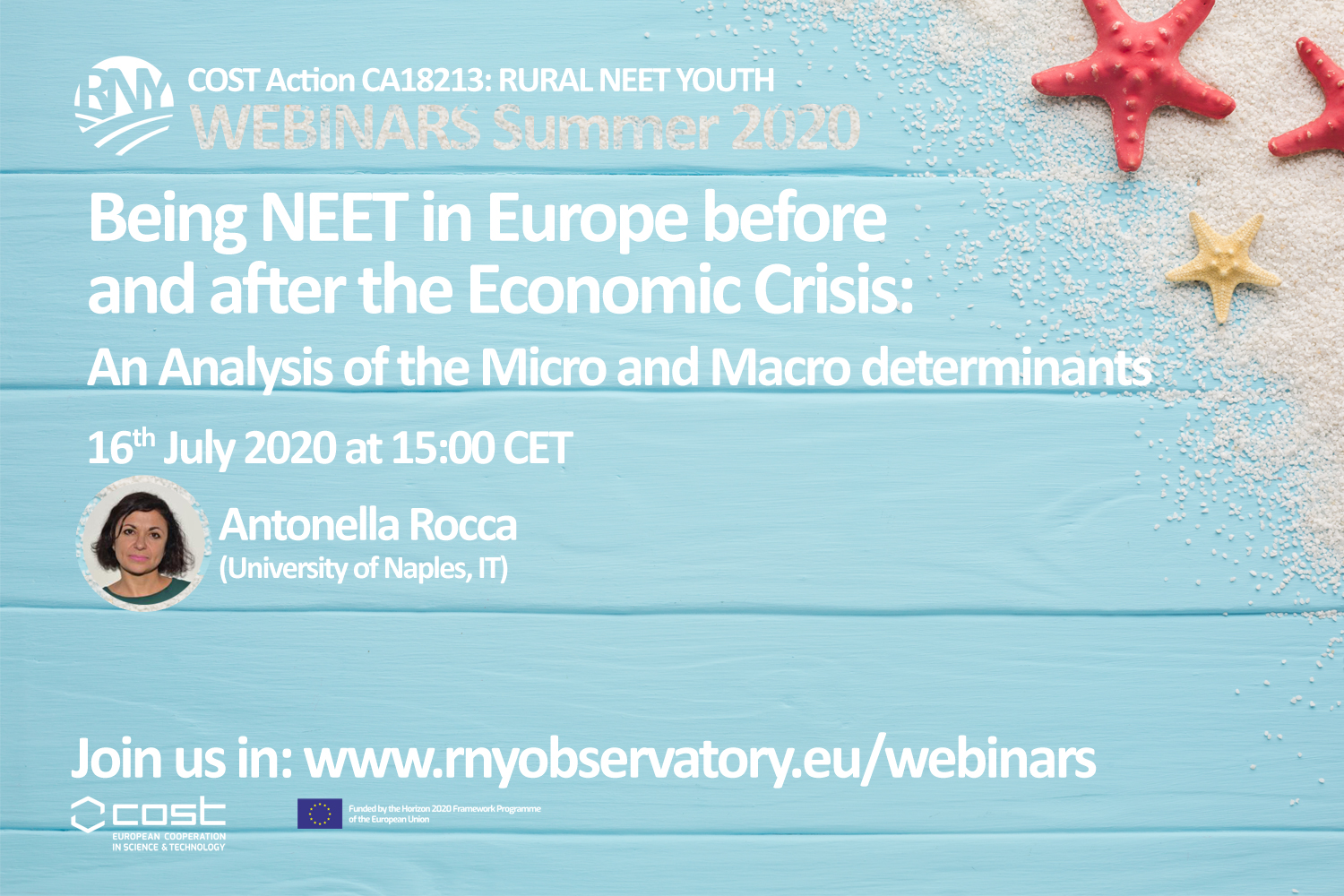
This webinar will analyse the main determinants of the propensity to NEET status in a selection of European countries. For the younger cohort, NEET status is mainly influenced by the school-to-work transition while for the older cohort (NYNA) this status is primarily due to labour market functioning and institutional factors. The NEET rate os directly related to the structural unfavourable conditions of the labour market and passive subsidies to the unemployed, and inversely to the rate of growth of GDP, the active labour policies and the investments in education
![]() Watch the recording on Facebook
Watch the recording on Facebook
20.July.2020 – 15:00h CET | Online meeting point
Miroslava Bavorova (Czech University of Life Sciences Prague)
The perceived prestige of agricultural occupations among youth
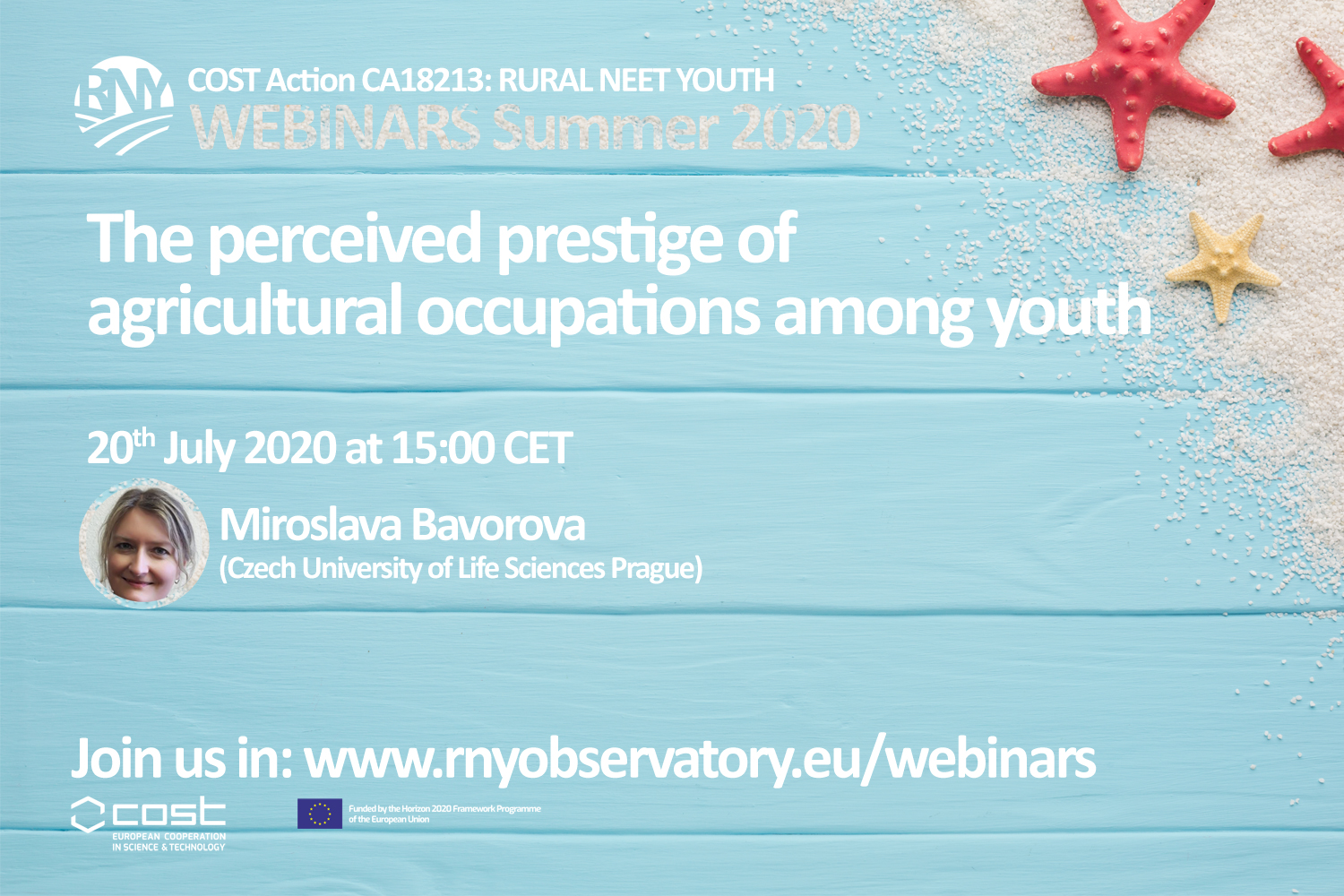
Low prestige of agricultural occupations may result in low interest of youth to work in agriculture. This
contributes to the lack of labour in agriculture and to rural-urban migration, problems prevalent
worldwide. Not much research has been done to understand the perceived prestige of agricultural
occupations. To close this gap, in the project presented, we investigate the occupational prestige level
of agriculture-related occupations relatively to other occupations as perceived by youth. We will present
a survey results from the Altai Krai in russian Siberia based on a sample of 350 students collected in
2018.
![]() Watch the recording on Facebook
Watch the recording on Facebook
31.July.2020 – 15:00h CET | ONLINE MEETING POINT
Ilkay Unay-Gailhard (Leibniz Institute of Agricultural Development in Transition Economies (IAMO))
Becoming a young farmer in the digital age: case studies on European islands
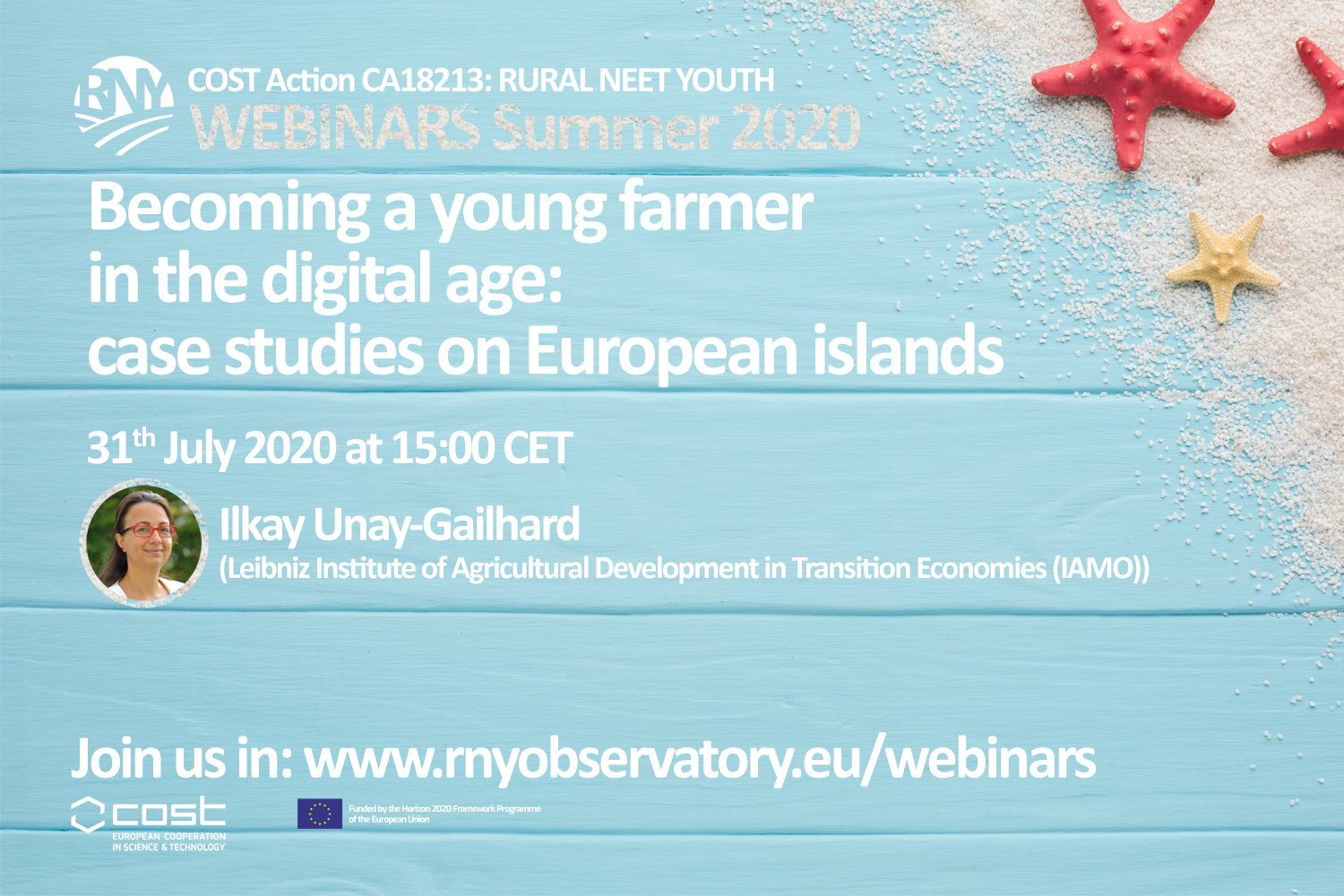
The purpose of the webinar meeting is twofold. First, presentation of carried activities during my 3
weeks Short-Term Scientific Mission (STSM) in the Azores Island, as well as at University Institute of
Lisbon. This first part of the presentation aims to give insights on the organization of STSM activities
that may be inspiring for the future STSM applicants. Second, presentation of primary results of STSM
scientific study “Becoming a young farmer in the digital age: case studies on European islands”. The
second part of the presentations has an objective to give primary findings of face to face interviews with
young farmers (< 40 years old) and experts from the Azores in order to answer the main research
question of “What are the specific mechanisms through which youth in late modernity can be most
effectively engaged with the agriculture system, not only as civic engagement, but also with farming as
a “career option»?.
![]() Watch the recording on Facebook
Watch the recording on Facebook
![]()

